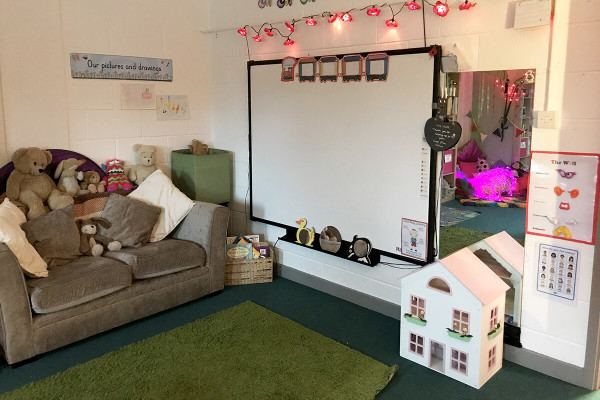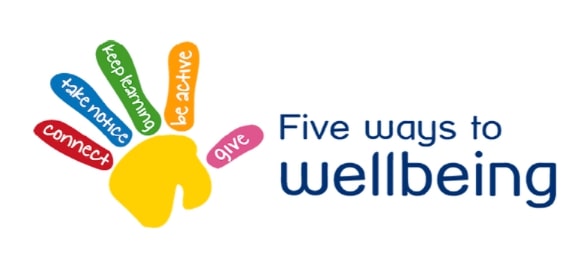
Wellbeing
The emotional wellbeing of pupils, staff, parents and carers is crucial to living a happy, successful and healthy life. There are times, however, when we all need a little support in achieving this.
Top Tips for boosting mental health
Talk - share your feelings with friends and family - it doesn't have to be a big sit down conversation, let it develop as you do something together.
Keep physically active - get all those endorphins going in the brain which help us feel good
Eat well and regularly - this regulates your blood sugar levels which impacts on your mood and helps concentration - your brain needs nutrients too!
Get a good night's sleep – one of the hardest things to do sometimes – but here are some tips:
- Leave your phone downstairs and get a traditional alarm clock
- Get into a good routine
- Practise some breathing and relaxation techniques
Connect with others and be sociable. Try volunteering - helping others can make you feel part of the community and make you feel good about your place in the world.
Do something you are good at! Lose yourself in an activity or hobby - enjoying yourself can help beat stress and achieving something can really boost your self-esteem.
Develop some coping strategies for difficult/stressful situations - these will be personal to you, but could include writing lists, listening to music, repeating positive phrases to yourself, imagining a calm landscape. Know what works for you and practice them so they are ready at hand.
Ask for help! One of the bravest things we can do is ask for help, and there is no weakness or shame in doing so! One of the most important ways we can keep healthy mentally is to recognise when you aren't feeling good.
There is a vast amount of support online that is free to access and offers guidance, advice, support and tips on how to deal with mental illnesses like anxiety and depression. This support ranges from case studies to helpful hints, and also offers phone numbers in case this support is required.
Promoting positive mental health is essential to success. The online support organisations below are some of the many ways we can extend the range of support available to our school and the wider community. Please see some useful links below and support materials from the Mental Health Foundation.
| Organisation | Support for... |
|---|---|
| Kooth | All young people. |
| Stonewall | Lesbian, gay, bisexual and transgender people and support for parents. |
| Dudley Mind | Young people, parents and carers. |
| Young Mind | Project based advice for young people and parents/carers. Helpline number for parents/carers. |
| Anxiety UK | Young people. Support for anxiety conditions. |
| Time to Change | Young people. Provides phone numbers for mental health charities, groups and services. |
| Heads Together | Young people. Promotes talking about mental health and getting rid of the stigma attached to it. |
| Place2Be | Parents/carers. Provides emotional support for children. |
| Starting Secondary School | Advice about getting ready to start secondary school. |
| CALM | Men |
| ChildNet | Parents and carers. Working to keep the internet a safe place to be. |
| What Centre | Parents and carers. A place for parents/carers to access services in the local area. |
| Samaritans | All people with suicidal thoughts. |
| The Children's Society | Advice for young people. |
| Selfharm UK/Virtual College | Free online course designed to help parents talk about the issue of self-harm with their children. |
| The Anna Freud National Centre for Children and Families | Support for families. |
| Parent Zone | Internet use. |
| Action for Happiness | Monthly calendars packed with actions you can take to help create a happier and kinder world. |
The Well

Wellbeing is how we think and feel about ourselves, our lives and our experiences.
The Well is an oasis of calm for children for quiet reflection in a friendly, welcoming cosy space.
The wellbeing centre ensures that children who are most vulnerable or experiencing adversity at home, feel safe and can talk their issues through with a member of the pastoral team to share how they think and feel about themselves and help them to cope. The social and emotional skills, knowledge and behaviours that young people learn in The Well can help them to build resilience and set the pattern for how they will cope later in life.
The Well also allows for early identification of a child's needs. When those who may be in need of additional support are identified, children will spend short periods of time with pastoral staff playing or talking on a 1:1 basis, sharing their anxieties and worries. This gives staff a deeper understanding of where to signpost a child's needs.
When children and young people feel good about themselves, feel that their life is going well, they will feel more about to get on with their daily lives.
A few simple steps can make a real difference in children achieving a happy and healthy life now and in the future. These include:
- Forming and maintaining positive relationships
- Eating a balanced diet
- Taking time to relax
- Recognising when help and support is needed and how to access it
- Learning about and recognising safe behaviour and choices
Worry Box
In our school we have two worry boxes for the children to use. These are placed at the worry stops in the downstairs corridor near to The ICT Technicians room and in the upstairs Corridor opposite the caretaker’s office.
Should a child have a small concern or if something is bothering them, they are able to write their name, class and worry on a small slip and put it into the worry box. The boxes are checked weekly and will be acted upon either by the child’s class teacher or by Mrs Edwards if need be.
Wellbeing Warriors
Our Wellbeing Warriors at Colley Lane Primary Academy are a group of 13 pupils from years 5 and 6 who have shown a real interest in championing positive mental health and wellbeing. These pupils have recently completed 6 weeks intensive training with Black Country Mental Health and are keen to share their learning around mental health and wellbeing with their peers.
During their training programme the Wellbeing Warriors were trained in a variety of wellbeing approaches and strategies. They are now able to support their peers through informal mentoring, buddying and support during play and lunch times. They are empowered through their learning to help their peers access mental health and wellbeing support in our school and they will encourage self-help.
The Warriors will have a responsibility for leading and promoting wellbeing throughout our school, and they will drive the message forward to help overcome the barriers children have around talking about feelings of low mood and mental health. They will encourage pupils to feel able to talk and to access help if needed.
Talk Time
At Colley Lane we offer Talk Time sessions to those who need a little extra support.
We all have times when it feels hard to talk to those closest to us about things which are bothering us. Often this can be because we don’t want to worry them, or we are afraid of what they might say. Talk Time is there to help when a child is feeling like this. We will listen to the child carefully, not judging them, but look to help them understand what might be bothering them and help to find ways to cope with their challenges or emotions.
The types of problems that often come up in Talk Time may include:
- Family difficulties
- School difficulties
- Relationships
- Loss and bereavement
- Friendship issues
- Lack of confidence
- Anger
- Behaviour issues
- Transition
- Anxiety
- Low mood
Children are identified and referred to us for Talk Time by Parents, Staff, or other professionals (a short waiting list may apply in some cases). In the first instance Mrs Edwards or Miss Hunt will see the child on a 1:1 basis over a 6-week period.
Following this initial period, we will review if talk time is still needed. If so, sessions may resume either 1:1, or the child may be put into a social group with other children experiencing the same kind of issue. (Please be assured your child would never be asked to talk about something personal or private in a group setting) We offer a number of different groups which look at the areas mentioned above. These groups take place on Talk-Time Tuesdays over at Our Hive and are carried out on a rota basis.
Five ways to Wellbeing
 At Colley Lane we try to include the five ways to wellbeing in everyday life. These are nationally recognised strategies that can be used to improve everybody’s wellbeing on a daily basis.
At Colley Lane we try to include the five ways to wellbeing in everyday life. These are nationally recognised strategies that can be used to improve everybody’s wellbeing on a daily basis.
CONNECT – With the people around you. With family, friends and neighbours. At home, work, school or in your local community.
BE ACTIVE – Go for a walk or run. Step outside. Cycle. Play a game. Garden. Dance.
TAKE NOTICE - Be curious. Catch sight of the beautiful. Remark on the unusual. Notice the changing seasons. Savour the moment, whether you are walking to school, eating lunch or talking to friends. Be aware of the world around you and what you are feeling.
KEEP LEARNING – Try something new. Rediscover an old interest. Sign up for that course. Take on a different responsibility at school. Fix a bike. Learn to play an instrument or how to cook your favourite food.
GIVE - Do something nice for a friend, or a stranger. Thank someone. Smile. Volunteer your time. Join a community group. Look out, as well as in.

